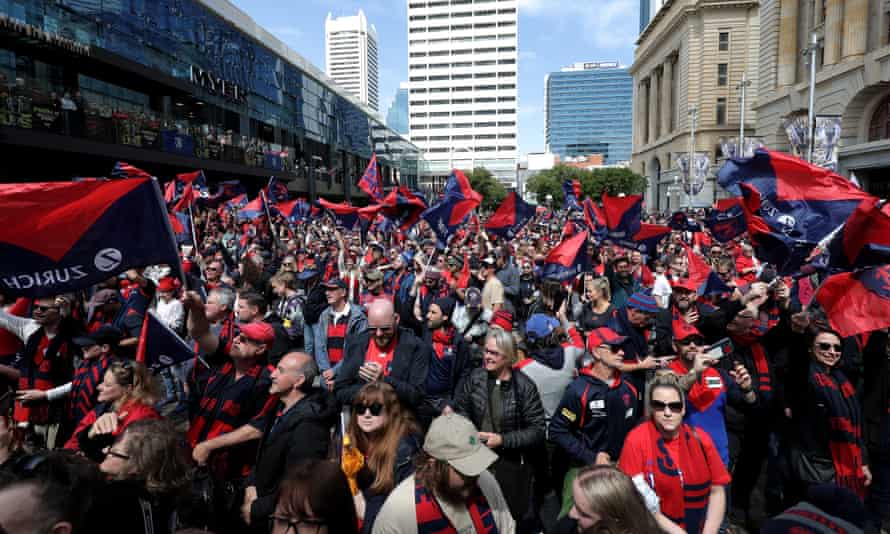
[ad_1]
When I was a kid, our family friend Lyn was my first introduction to a football devotee. In my house our team was Geelong, but we didn’t live and breathe their success or failure day to day. Lyn loved the Melbourne Football Club with a completeness that was both puzzling and brave. Puzzling in that I was not used to adults demonstratively adoring their interests like we did. Brave in that even then, I knew some teams were marked with a shadow, doomed to suffer.
The anatomy of the loser club fascinates in its variety. Growing up through the 1990s, Fitzroy and St Kilda wrestled in the mud at the foot of the ladder while Sydney watched on. There was Richmond always finishing ninth, missing the knockouts by one. Footscray’s long streak of preliminary finals without ever breaking through. Geelong made grand finals but lost them relentlessly – four in seven years. It makes a compelling philosophical debate: when is the sting of failure worse? To fall just short? To never know how it feels to get close? To land between, avoiding either pole?
Among those loser teams were Melbourne, deep red and deep blue, the strangely generic name of a whole city where other clubs bristled with suburban specificity, the cartoon Demons with their horns and pitchforks striking an absence of fear into anyone. Often down with the Saints and Lions, sometimes bobbing up for a season. There were patches. The era of Garry Lyon and Jim Stynes. David Schwarz between knee ops, David Neitz clunking a few. Russell Robertson would do tricks, Adem Yze would cruise through midfield. Most often it would be about Jeff Farmer, dancing in the pocket and standing on someone’s head and threatening Fred Fanning’s goal-kicking record for a dazzling hour.
But even when Melbourne did well, it never felt like Melbourne were good. It was something that happened to them, not a quality they possessed. In 1988 and in 2000 Melbourne teams played grand finals, but they entered both as stepladders for the coronation of champion teams. The mark could not be removed.
With so many methods of being unsuccessful, what bonded the loser teams was the wait. While upstarts like West Coast and Adelaide strolled in and started stacking their shelves with shiny silver cups, these longer-standing clubs marked time. Richmond had the most recent flag in 1980 but had been a comedy case since. St Kilda hadn’t won since 1966, Melbourne 1964, Geelong 1963, Footscray 1954, Fitzroy 1944, South Melbourne 1933. Back to the days of flatcaps and nightcarts and hobnail boots.

All of which collectively was anomalous. One charm of the AFL, with its equalisation structure and inexplicable runs of form, is that any supporter of any side can approach each new season with the thought that this might be the year. Some are less likely, some soon have hope dispelled, but often pre-season analysis is made worthless when a team storms up the ladder or drops like a stone. On the cycle goes, the contenders changing by the autumn.
Meanwhile, the bloated leviathans of European football heave into view each season mere weeks after their last outings, shadows blotting out all around them, dividing the spoils between the other few host organisms for dystopian petrostates. The English title of 2016 wasn’t about the fairytale of Leicester City winning the league, it was the fairytale of anybody winning from outside the monoliths. The monoliths immediately doubled their efforts to make sure no one would ever again take what belongs to them.
In today’s AFL, no drought is long enough to newly qualify for the Losers’ Club. Next in line might be Fremantle, approaching 30 years since birth, while Carlton is on the fast track after two decades of dysfunction. But neither yet. And one by one, since the 2000s, the existing losers began to leave. Fitzroy was the least intact, but what was left in Brisbane saw three flags in a row. Sydney won a couple, six years apart. Geelong collected three in a dynasty, Richmond did the same. The Bulldogs came from the clouds in 2016. And now Melbourne, here at last. Leaving only the Saints, so close three times in two seasons, to turn off the lights on the way out.
Quick Guide
How do I sign up for sport breaking news alerts?
Show
- Download the Guardian app from the iOS App Store on iPhones or the Google Play store on Android phones by searching for ‘The Guardian’.
- If you already have the Guardian app, make sure you’re on the most recent version.
- In the Guardian app, tap the yellow button at the bottom right, then go to Settings (the gear icon), then Notifications.
- Turn on sport notifications.
When the Demons were halfway through smashing up the Cats in the preliminary final, in a blaze of fast footy that left no time for breath, I started thinking about my long-suffering Melbourne friends. This was different gravy, a team full of surging self-belief, all theirs. I thought of the weight that lifted from me in 2007, when Geelong broke through; exhaustion more than elation, and something more profound than sport sceptics understand.
Most of all I thought of Lyn, of an age where she might remember a little of 1964 but would mostly remember what had happened since. That figure in all the reporting, of 57 years, was notional for most of the people saying it. For her, each of those years had been lived through. “Enjoy the grand final,” said the text I sent. I didn’t unnerve her by saying the other part: that they were going to win it. They weren’t going into this one as the prop for someone else’s glory. They were going for their own.
[ad_2]
Source link